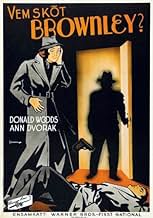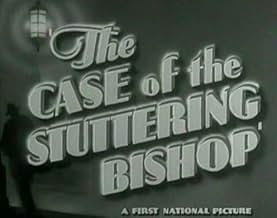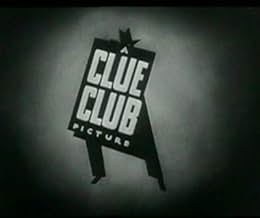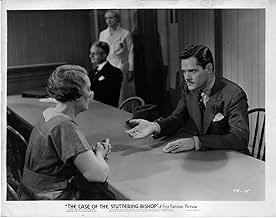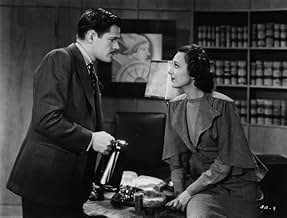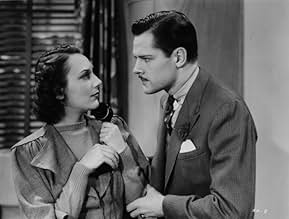An improbable stuttering bishop from Australia asks for Perry Mason's help in proving the identity of the legitimate heir to a millionaire.An improbable stuttering bishop from Australia asks for Perry Mason's help in proving the identity of the legitimate heir to a millionaire.An improbable stuttering bishop from Australia asks for Perry Mason's help in proving the identity of the legitimate heir to a millionaire.
- Director
- Writers
- Stars
Helen MacKellar
- Stella Kenwood
- (as Helen McKellar)
Charles C. Wilson
- Hamilton Burger
- (as Charles Wilson)
Eddy Chandler
- Detective James Fleet
- (uncredited)
- Director
- Writers
- All cast & crew
- Production, box office & more at IMDbPro
Featured reviews
The Perry Mason series of mysteries from the 1930s are some of the best mysteries one could watch. One needs to pay attention to details throughout the film to follow the twists in the plot, which in this movie is very complicated. The movies closely follow the Erle Stanley Gardner mystery novels on which they are based. The Case of the Stuttering Bishop holds one's interest from beginning to end as Perry Mason cleverly addresses the case of a murder committed over a will, inheritance and the fraudulent identity of a key player. Donald Woods does not play the role of Perry Mason as well as Warren William did in this series. William plays the role with panache and wit, whereas Donald Woods plays the role straightforward with no flair—serviceable but not exciting. Ann Dvorak plays the role of Della Street straightforward also with none of the sassiness and cuteness of Genevieve Tobin and none of the glamour and screen presence of Helen Trehnolme in other movies in the series. If you are a fan of old, intriguing mysteries, you won't be disappointed with this gem.
We had two great evolutionary paths in the 30s. One was an amazing diversity of invention to settle some basic narrative devices that have since served us well as the basic vocabulary of cinema. The other, parallel path was the pulp detective novel, a master of which was Gardner.
The traditional, Holmes form is that you are linked to the detective. You discover what he does. Christie followed this form, but it is difficult to render in film. Gardner may be the first case — since common — of the novel adopting cinematic form. His formula does seem friendly to film: we see events that Mason does not, often before he gets seriously engaged. These events give us a false impression of what happened, so we as viewers start out with a deficit.
Then we have the detection; Mason and company are detectives in act two. The third act is always a courtroom, which is why our detective has to be a lawyer. Courtroom conventions have their own evolution in film, and this instance is limited to what in Christie's stories has to be a contrived assembly of the suspects.
This format allows for more complicated mysteries than were usual in film. My own preference for 30's detection is Philo Vance because the formula was not so strict. But this is a good one in terms of allowing complexity and surprise. We have that here in this solid instance.
One of the decisions in defining the characters is how intimate to make the relationship between alpha male Mason and his pretty and competent secretary. Why this matters has to do, as Mason would say, with motive. We like the guy. He is smart, as smart as other detectives, but why he does what he does
In some renderings of the Mason format, he just likes to win. He has his own Lestrade who he likes humiliating. Justice is incidental, and truth merely a tactic. He just like to strut.
In other renderings, he does what he does because he loves his team, his closest friend Drake and his lover Della. Both are profoundly loyal and true. He struts for her and we imagine passion after the obligatory Italian restaurant scene.
Here, a delicate balance between the two is maintained.
The traditional, Holmes form is that you are linked to the detective. You discover what he does. Christie followed this form, but it is difficult to render in film. Gardner may be the first case — since common — of the novel adopting cinematic form. His formula does seem friendly to film: we see events that Mason does not, often before he gets seriously engaged. These events give us a false impression of what happened, so we as viewers start out with a deficit.
Then we have the detection; Mason and company are detectives in act two. The third act is always a courtroom, which is why our detective has to be a lawyer. Courtroom conventions have their own evolution in film, and this instance is limited to what in Christie's stories has to be a contrived assembly of the suspects.
This format allows for more complicated mysteries than were usual in film. My own preference for 30's detection is Philo Vance because the formula was not so strict. But this is a good one in terms of allowing complexity and surprise. We have that here in this solid instance.
One of the decisions in defining the characters is how intimate to make the relationship between alpha male Mason and his pretty and competent secretary. Why this matters has to do, as Mason would say, with motive. We like the guy. He is smart, as smart as other detectives, but why he does what he does
In some renderings of the Mason format, he just likes to win. He has his own Lestrade who he likes humiliating. Justice is incidental, and truth merely a tactic. He just like to strut.
In other renderings, he does what he does because he loves his team, his closest friend Drake and his lover Della. Both are profoundly loyal and true. He struts for her and we imagine passion after the obligatory Italian restaurant scene.
Here, a delicate balance between the two is maintained.
Donald Woods takes over the role of Perry Mason in the last of the Mason series that Warner Brothers did in the 30s with Ann Dvorak as Della Street in
The Case Of The Stuttering Bishop. Erle Stanley Gardner's lawyer/sleuth
would have to wait for television and Raymond Burr for its next incarnation.
Edward McWade, a bishop who stutters comes from Australia to see Woods about a possible fraud being perpetrated on millionaire Gordon Oliver regarding a fake granddaughter being foisted upon him. Later on Myra McKinney, Oliver's estranged daughter-in-law is arrested and it's Perry Mason for the defense.
Hamilton Burger played by Charles Wilson and Joseph Crehan as Paul Drake also appear. Burger for his one and only time in the movie series and Drake is a more traditional private eye. Previously Drake was "Spudsy Drake" played for comic relief by Allen Jenkins in previous films.
Viewers of the classic TV series will note that this observes the Perry Mason paradigm about never having guilty clients and the killer being unmasked in court. Previous films strayed from that somewhat.
I have to mention Tom Kennedy who took a leave from the Torchy Blaine series and brought his usual thick as a brick detective character with him. He's a favorite so incredibly droll and so naive.
Watch it for Tom Kennedy alone.
Edward McWade, a bishop who stutters comes from Australia to see Woods about a possible fraud being perpetrated on millionaire Gordon Oliver regarding a fake granddaughter being foisted upon him. Later on Myra McKinney, Oliver's estranged daughter-in-law is arrested and it's Perry Mason for the defense.
Hamilton Burger played by Charles Wilson and Joseph Crehan as Paul Drake also appear. Burger for his one and only time in the movie series and Drake is a more traditional private eye. Previously Drake was "Spudsy Drake" played for comic relief by Allen Jenkins in previous films.
Viewers of the classic TV series will note that this observes the Perry Mason paradigm about never having guilty clients and the killer being unmasked in court. Previous films strayed from that somewhat.
I have to mention Tom Kennedy who took a leave from the Torchy Blaine series and brought his usual thick as a brick detective character with him. He's a favorite so incredibly droll and so naive.
Watch it for Tom Kennedy alone.
As someone who has read all 82 of the Perry Mason novels, I have to say that this is the best I've seen of the Warner Brothers Perry Mason films. Readers of Gardner's mysteries will appreciate how faithfully the screen writers were able to keep to the essentials of the original plot in this short 70 minute film.
This film is far superior to the turkeys WB made with Warren William (although that's not saying much.) And Donald Woods was more like the literary Mason than Raymond Burr, who was almost fat enough by the end of the TV series to play Nero Wolfe!
And, of course, there's the great 1930's atmosphere in this film, something the TV series could never hope to reproduce.
This film is far superior to the turkeys WB made with Warren William (although that's not saying much.) And Donald Woods was more like the literary Mason than Raymond Burr, who was almost fat enough by the end of the TV series to play Nero Wolfe!
And, of course, there's the great 1930's atmosphere in this film, something the TV series could never hope to reproduce.
You can often tell when a studio is losing interest in a film series when they start replacing the entire cast. In this instance, they did it twice in 2 films-- and by the time of THE CASE OF THE STUTTERING BISHOP, we'd not only seen 3 Perry Masons in 6 films, but 5 different Della Streets! Donald Woods does his 2nd PM film, having played one of the suspects in ...THE CURIOUS BRIDE, while William Clemens directs his 2nd PM film, having already done the relatively sober ...VELVET CLAWS. Clemens would go onto quite a few series films, including a Torchy Blane, 4 Nancy Drews, a Dead Ends Kids, a Philo Vance, and 3 Falcons. There's nothing especially flashy or stylish about this film, and it starts out very confusing, but it is a solid mystery film, and gets better as it goes.
For example, you have the boastful house detective who Perry winds up hiring part-time, and as the story goes on he proves to be genuinely helpful, rather than "merely" comic relief. It seems the murder takes forever to happen in this one, but once it does, the story FINALLY kicks into gear, and the courtroom sequence at the end is probably the BEST in all 6 films. Unlike when Perry rattled off confusing info nobody but HE knew in the previous installment, the quick stream of witness testimonies actually help to pull all the threads of the story together neatly. And at last, there's the patented "blurted out confession" seen in so many PM stories-- only in this case, NOT from the person being grilled on the stand.
It's been said that sometimes casting actors very accurate to novels can lead to dull films. Some of the most popular versions of characters are quite unlike their literary sources-- good examples being Sean Connery's JAMES BOND and Stacy Keach's MIKE HAMMER. In this case, I find myself wishing Warren William had done more films like this one-- his version of Perry might not be thought of as so much of a joke then.
For example, you have the boastful house detective who Perry winds up hiring part-time, and as the story goes on he proves to be genuinely helpful, rather than "merely" comic relief. It seems the murder takes forever to happen in this one, but once it does, the story FINALLY kicks into gear, and the courtroom sequence at the end is probably the BEST in all 6 films. Unlike when Perry rattled off confusing info nobody but HE knew in the previous installment, the quick stream of witness testimonies actually help to pull all the threads of the story together neatly. And at last, there's the patented "blurted out confession" seen in so many PM stories-- only in this case, NOT from the person being grilled on the stand.
It's been said that sometimes casting actors very accurate to novels can lead to dull films. Some of the most popular versions of characters are quite unlike their literary sources-- good examples being Sean Connery's JAMES BOND and Stacy Keach's MIKE HAMMER. In this case, I find myself wishing Warren William had done more films like this one-- his version of Perry might not be thought of as so much of a joke then.
Did you know
- TriviaAuthor Erle Stanley Gardner objected so vehemently to what he felt was the miscasting of Ricardo Cortez as Mason, that Warners replaced him with Donald Woods.
- GoofsNear the end, when Mason and his crew are having lunch during a court recess, Della drops her fork on her plate and reaches out across the table to break off some bread (after giving Mason the inadvertent hunch about Stella Kenwood). When the camera cuts back to Mason, Della has fork in hand again, but not the bread.
- Quotes
Perry Mason: [to Della] Bishops don't often need lawyers. Show him in.
- ConnectionsFeatured in Le grand sommeil (1946)
- SoundtracksWhen Irish Eyes Are Smiling
(1912) (uncredited)
Music by Ernest Ball
Lyrics by Chauncey Olcott and George Graff
Sung a cappella with a phony Irish brogue by Donald Woods
Details
- Release date
- Country of origin
- Language
- Also known as
- Clue Club #10: The Case of the Stuttering Bishop
- Filming locations
- Production company
- See more company credits at IMDbPro
- Runtime1 hour 10 minutes
- Color
- Sound mix
- Aspect ratio
- 1.37 : 1
Contribute to this page
Suggest an edit or add missing content

Top Gap
By what name was The Case of the Stuttering Bishop (1937) officially released in India in English?
Answer
